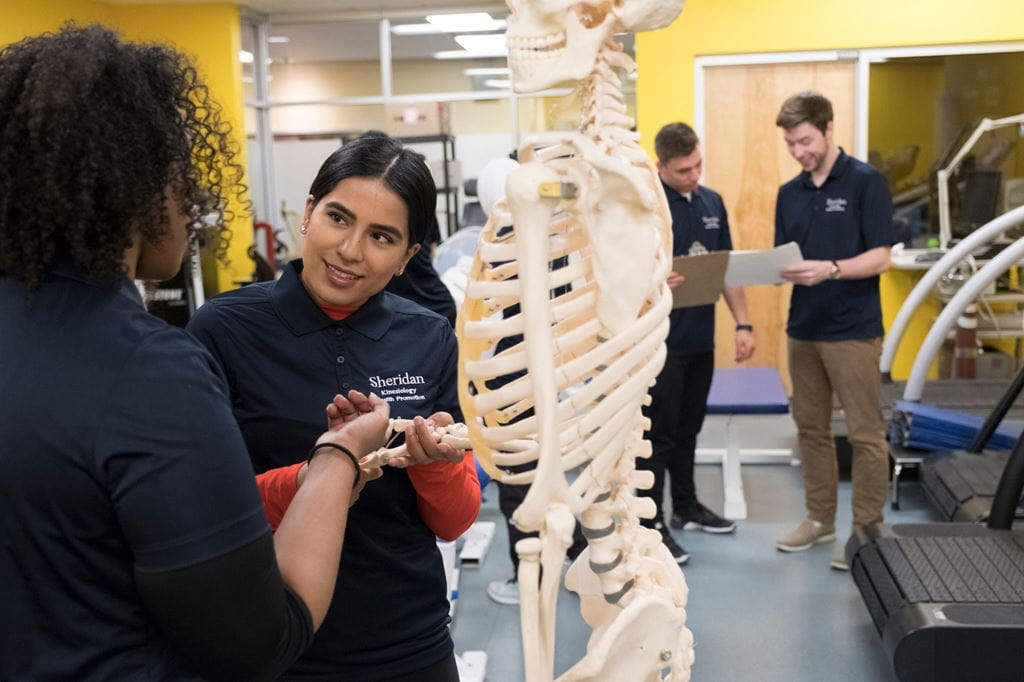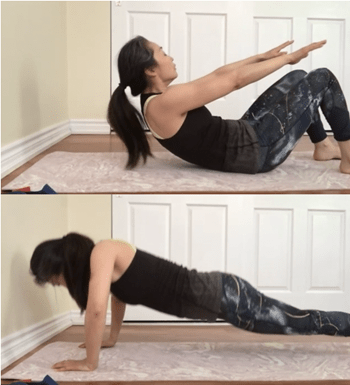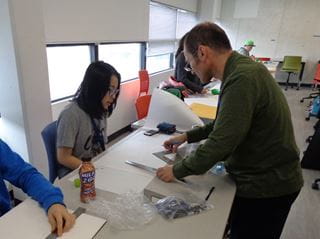
Kinesiology students help make health and wellness more accessible
 by Jon Kuiperij – May 10, 2021
by Jon Kuiperij – May 10, 2021 For nearly a decade, Sheridan has worked with Home Suite Hope to help break the cycle of poverty by providing bursaries that offset the cost of college education and allow for internship opportunities and other targeted supports. This year, faculty and students in Sheridan’s Bachelor of Health Sciences – Kinesiology and Health Promotion degree found another important way to assist single parent-led Halton families who are facing homelessness.
Eleven kinesiology students recently spent their field placements teaching health and wellness skills to Home Suite Hope clients as part of a new partnership between Sheridan and the Oakville-based charity. Five students created personalized training programs that were based on the space and needs of Home Suite Hope clients, while the other six developed health and wellness modules that Home Suite Hope will be able to use for years to come.
 “Health and wellness is something we’ve always valued,” says Home Suite Hope Program Manager Catherine Lucasan, noting her organization has teamed with the YMCA of Oakville to offer subsidized memberships, “but the COVID-19 pandemic and the transportation challenges faced by many of our clients have made things more difficult. When I learned that Sheridan kinesiology students provide individual support based on access and goals, I thought, ‘Of course, this makes sense.’”
“Health and wellness is something we’ve always valued,” says Home Suite Hope Program Manager Catherine Lucasan, noting her organization has teamed with the YMCA of Oakville to offer subsidized memberships, “but the COVID-19 pandemic and the transportation challenges faced by many of our clients have made things more difficult. When I learned that Sheridan kinesiology students provide individual support based on access and goals, I thought, ‘Of course, this makes sense.’”
Lindsay Anderson, Director of Clinical and Experiential Learning in Sheridan’s Faculty of Applied Health and Community Studies (FAHCS), first saw potential for the partnership last fall after joining a mentorship program that connects Sheridan executives, faculty and administrators with Home Suite Hope clients who need help navigating post-secondary studies, searching for employment and living their day-to-day lives. “Instead of having our students gain experience providing services to people who might already have access to these supports,” asks Anderson, “why not offer it to individuals who may not have access?”
It was also a perfect fit for Sheridan’s kinesiology program — especially given the shortage of traditional in-person field placement opportunities due to the pandemic. “It was such a win-win,” says field placement supervisor Deanna Lawson-Langford, who also helped students secure placements with Cruisers Sports, a Mississauga charitable organization that offers athletic programs and equipment for people with physical disabilities. “Home Suite Hope clients aren’t usually able to get these types of services, especially personal training that provides them with a program specifically designed for their needs and space and body. And our students got the opportunity to put their skills to use and see how health, wellness and fitness can be a game-changer for people.”
'Exercise gives you energy'
It didn’t take long for Home Suite Hope clients to notice a difference in their lives. “Being active affects everything for me. It’s a weight on my mind when I know I shouldn’t be sitting around all day, so exercising helps me a lot mentally,” says Robin, a single mother whose daughter lives with cerebral palsy. “It can be hard at the beginning, but once you get into a routine, I feel like the exercise gives you energy. And when you’re the single parent of a special needs child, you need all the energy you can get.”
Having a program designed specifically for her was also a big help, notes Robin, whose routine incorporated household furniture as well as an exercise ball and mat she’d previously purchased for her daughter. “My trainer worked with equipment I had and built a program that included lunges, squats, pushups and many other exercises,” she says. “Even just having a commitment to regular virtual meetings with a trainer kept me going.”
Whether it was having to think creatively to design accessible personal training regimens, developing the content modules series (areas of focus included physical activity for parents and children, stress management, sleep, and positive mindset) or supporting clients in a remote environment, Lawson-Langford believes the experience students gained through the partnership will be extremely valuable post-pandemic.
“Online virtual training and fitness delivery modules are here to stay,” she says, “and our students got hands-on experience doing research, making videos, creating worksheets and uploading evergreen content. They were also really inventive in finding ways to work around barriers that people might not normally think of, such as poor internet connections or a lack of access to traditional equipment.”
“Instead of having our students gain experience providing services to people who might already have access to these supports, why not offer it to individuals who may not have access?" - Lindsay Anderson
As part of the partnership, several Sheridan students received financial assistance through a grant from the Government of Canada’s Innovative Work-Integrated Learning Initiative (IWIL) and Co-operative Education, Work-Integrated Learning (CEWIL) Canada’s Innovation Hub (iHUB). FAHCS applied for the grant, which also provided money to purchase personal training equipment that can be used by present and future Home Suite Hope clients.
“Whatever roadblocks we’re facing in our life, improving our fitness can help us overcome them,” Lawson-Langford says. “We primarily think about food and shelter and safety, but an emphasis on health and wellness is just as important.”
Pictured above left: Hongmei (Michelle), a Home Suite Hope client, participates in a virtual training session.
Popular stories
- Sheridan celebrates the return of Netflix series “Blown Away”
- Sheridan welcomes Mary Vaughan as new Provost and Vice President Academic
- Sheridan once again ranked top animation school in Canada, second in world
- Sheridan alumni nominated for record number of Canadian Screen Awards
- Sheridan becomes the fourth Adobe Creative Campus in Canada
Media Contact
Meagan Kashty
Manager, Communications and Public Relations








